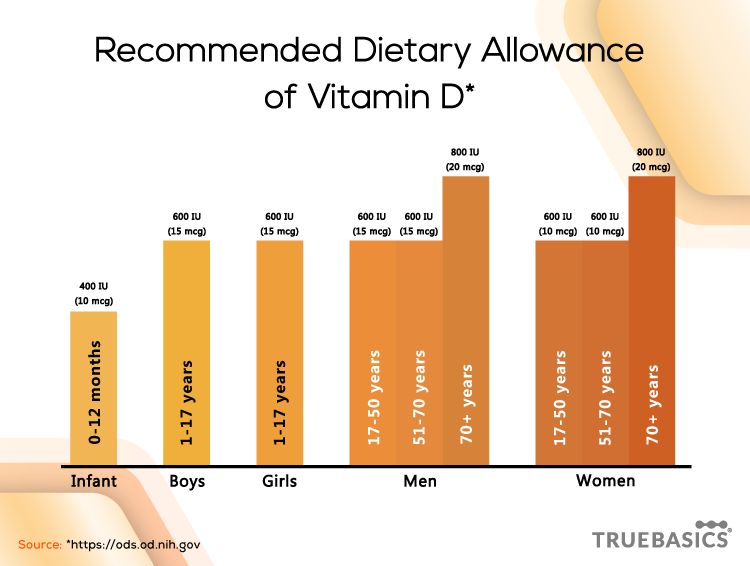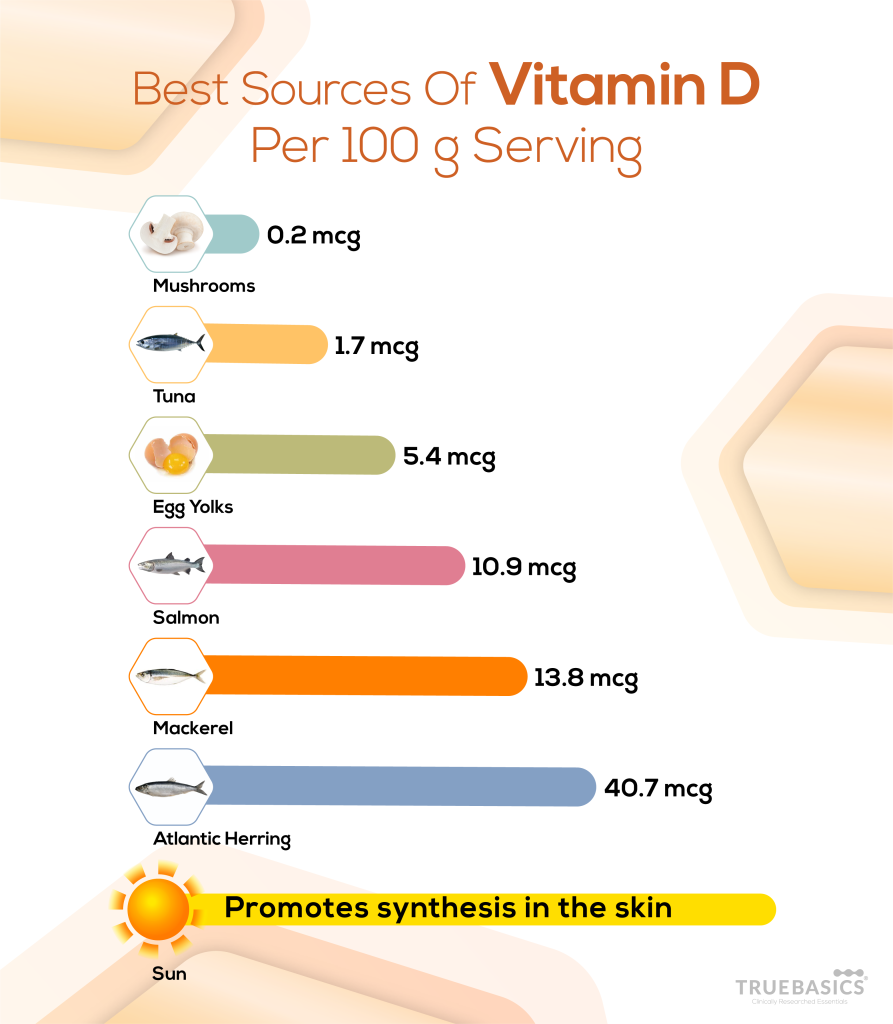First off, Vitamin D is not a vitamin but a prohormone produced in the skin from 7-dehydrocholesterol[1]. Moreover, it is not one substance but 5 different substances[2]. From these 5, Vitamin D2 (that’s ergocalciferol) and Vitamin D3 (that’s cholecalciferol) are identified as being essential to human beings[3]. Vitamin D2 is found in nature in mushrooms that have been exposed to sunlight, which is because of their ergosterol content (a yeast compound), which on exposure to the sun’s UV rays is converted to ergocalciferol. Vitamin D3, on the other hand, is synthesised in our skin when cholesterol in our body is exposed to sunlight.[4]
Why is Vitamin D Important?
Research has shown that Vitamin D’s importance goes beyond calcium absorption for bone growth. It has shown its vital nature in the processes of cell growth modulation and the functioning of the immune system[5]. To maintain the calcium balance throughout the body, Vitamin D acts on our intestines, parathyroid glands, kidneys, and bones. Its receptors are also found in our cardiovascular systems, pancreas, lungs, skeletal muscles and skin[6]. Its functions and roles in specific body conditions are as follows.
Rickets
Rickets, a skeletal disorder with weak and soft bones, is a rare condition that usually develops in children who have a deficiency in Vitamin D. Supplementation of the same, hence, is the prescribed method of treatment.[7]
Cognitive health
Vitamin D receptors are widespread in brain tissue, and its form which is biologically active in the body has neuroprotective effects. In a research conducted on a group of people above 60 who suffered from dementia, it was found that Vitamin D helps in redeveloping cognitive health.[8]
Osteoporosis
Over time, our bones lose their mineral content and this leads to strain in the bones, weakness in the muscles and a condition known as osteomalacia (or soft bones). Consuming Vitamin D, again, is the recommended mode of treatment of this illness, as it regulates the calcium and phosphate levels in our body which are necessary for bone development.[9]
It is, thus, safe to say that Vitamin D is essential for human survival and growth.
How does Vitamin D affect immunity?
Apart from cell growth modulation and regulating the calcium reception in the bones, Vitamin D has an especially crucial role to play in maintaining a functioning immune system. Some of its immunity-promoting functions have been listed below.
It fends off respiratory infections
According to a research, a deficiency of Vitamin D has been associated with a weakened immune response in the body and can increase a person’s susceptibility to infection. These studies also show that Vitamin D’s deficiency may lead to a statistically higher risk of catching infections in the upper respiratory tract, and deficiency of calcidiol, which is a form of Vitamin D, may lead to greater chances of being infected with influenza, tuberculosis, and viral infections.[10]
It activates T cells
Vitamin D protects our bodies from viral infections by activating T cells. These T cells contain and destroy foreign pathogens and viruses that may have entered our bodies and help in fending off growing illnesses. Moreover, Vitamin D in the form of calcitriol helps in avoiding T cells to trigger during autoimmunity. It does so by blocking the production of specific helper T cells which are required to trigger autoimmunity.[11]
It might worsen autoimmune diseases
Though there’s no proven connection between vitamin D deficiency and autoimmune diseases, some studies have observed low levels of vitamin D in patients suffering from several autoimmune diseases like rheumatoid arthritis, multiple sclerosis, and inflammatory bowel disease. So Vitamin D deficiency may not cause autoimmune diseases, but vitamin D deficiency can play a role in worsening the condition.[12]

What happens to your immunity when there is a lack of Vitamin D?
Vitamin D is naturally produced in our bodies in response to sunlight falling on our skin. While Rickets and Osteomalacia are common disorders faced with a Vitamin D deficiency, there are several risks to immunity too. Although low levels of Vitamin D don’t cause autoimmune diseases, it sure can worsen the situation. Moreover, the low levels have also been known to cause respiratory infections. With its key role in regulating immune reactions that imply autoimmune response in our bodies, leading to diseases viz. Multiple Sclerosis, this nutrient just might be the cornerstone of keeping safe from foreign pathogens and autoimmune diseases.[13][14][15]
Rich Sources of Vitamin D
Older adults, who don’t get sufficient exposure to sunlight, have trouble absorbing Vitamin D. Taking Truebasics multivitamins tablets might be the only fortified Vitamin D sources for such individuals. With the aim of maintaining bone health, approximately 400 IU is recommended for children aged 1 year or below. For other people, 600 IU of Vitamin D is the recommended daily consumption.

To fulfil this requirement, there are many different sources of Vitamin D, as listed below.
D2 sources [16][17]
- Vitamin D2 supplements
- Mushrooms
- Fortified foods like milk, cereal
D3 sources [18][19]
- Sunlight (accounts for almost 90% of Vitamin D3 synthesis in body)
- Fat fishes ( Tuna , Salmon , Mackerel etc. )
- Butter
- Cheese
- Egg yolk
- Vitamin D3 supplements
- Fortified food products including breakfast cereal, orange juice etc.

Conclusion
Vitamin D has a major role to play in building strong bones by regulating synthesis of minerals like calcium and phosphate in the body. Its receptors are present in our brains, cardiovascular systems, reproductive systems, skin, among other places, to perform crucial functions. Its deficiency leads to softer and more fragile bones (called Rickets in children, and osteomalacia in adults) and may cause respiratory infections like Tuberculosis and Influenza. Vitamin D is also a great immunity booster as it activates T cells which fight off foreign pathogens and destroys T cell supporting cells in case of an autoimmune response. With sunlight being the natural source for Vitamin D3 synthesis in our bodies, this nutrient is key for a healthy lifestyle.
Sources :
[1] “From vitamin D to hormone D: fundamentals of the vitamin D ….” 1 Aug. 2008, https://academic.oup.com/ajcn/article/88/2/491S/4649916. Accessed 5 Jul. 2020.
[2] “Vitamin D – Health Professional Fact Sheet.” 24 Mar. 2020, https://ods.od.nih.gov/factsheets/VitaminD-HealthProfessional/. Accessed 5 Jul. 2020.
[3] “Discovery of Vitamin D: The Contribution of Adolf Windaus ….” 1 Oct. 2004, https://academic.oup.com/jn/article/134/6/1299/4688802. Accessed 5 Jul. 2020.
[4] “Vitamin D | The Nutrition Source | Harvard T.H. Chan School ….” https://www.hsph.harvard.edu/nutritionsource/vitamin-d/. Accessed 5 Jul. 2020.
[5] “Vitamin D and the Immune System – NCBI – NIH.” 1 Aug. 2012, https://www.ncbi.nlm.nih.gov/pmc/articles/PMC3166406/. Accessed 5 Jul. 2020.
[6] “The Vitamin D Receptor: New Paradigms for the Regulation of ….” https://www.ncbi.nlm.nih.gov/pmc/articles/PMC2879406/. Accessed 5 Jul. 2020.
[7] “Vitamin D Deficiency Rickets – National Organization for Rare ….” https://rarediseases.org/rare-diseases/rickets-vitamin-d-deficiency/. Accessed 5 Jul. 2020.
[8] “Association between vitamin D deficiency and cognitive ….” 21 Feb. 2020, https://www.ncbi.nlm.nih.gov/pmc/articles/PMC7034713/. Accessed 5 Jul. 2020.
[9] “Calcium and Vitamin D – National Osteoporosis.” 8 Mar. 2018, https://www.nof.org/patients/treatment/calciumvitamin-d/. Accessed 5 Jul. 2020.
[10] “Vitamin D and the Immune System – NCBI – NIH.” 1 Aug. 2012, https://www.ncbi.nlm.nih.gov/pmc/articles/PMC3166406/. Accessed 5 Jul. 2020.
[11] “Vitamin D and 1,25(OH)2D Regulation of T cells – NCBI.” 22 Apr. 2015, https://www.ncbi.nlm.nih.gov/pmc/articles/PMC4425186/. Accessed 5 Jul. 2020.
[12] “The Complex Role of Vitamin D in Autoimmune Diseases.” https://pubmed.ncbi.nlm.nih.gov/18510590/. Accessed 17 Jul. 2020.
[13] “Vitamin D and the Immune System – NCBI – NIH.” 1 Aug. 2012, https://www.ncbi.nlm.nih.gov/pmc/articles/PMC3166406/. Accessed 5 Jul. 2020.
[14] “Vitamin D and Immune Function – NCBI.” 5 Jul. 2013, https://www.ncbi.nlm.nih.gov/pmc/articles/PMC3738984/. Accessed 5 Jul. 2020.
[15] “Vitamin D and the Immune System | Journal of Investigative ….” https://jim.bmj.com/content/59/6/881. Accessed 5 Jul. 2020.
[16] “On call: Vitamin D2 or D3? – Harvard Health.” https://www.health.harvard.edu/newsletter_article/vitamin-d2-or-d3. Accessed 5 Jul. 2020.
[17] “Appendix 12. Food Sources of Vitamin D – 2015-2020 Dietary ….” https://health.gov/our-work/food-nutrition/2015-2020-dietary-guidelines/guidelines/appendix-12/. Accessed 5 Jul. 2020.
[18] “On call: Vitamin D2 or D3? – Harvard Health.” https://www.health.harvard.edu/newsletter_article/vitamin-d2-or-d3. Accessed 5 Jul. 2020.
[19] “Appendix 12. Food Sources of Vitamin D – 2015-2020 Dietary ….” https://health.gov/our-work/food-nutrition/2015-2020-dietary-guidelines/guidelines/appendix-12/. Accessed 5 Jul. 2020.













